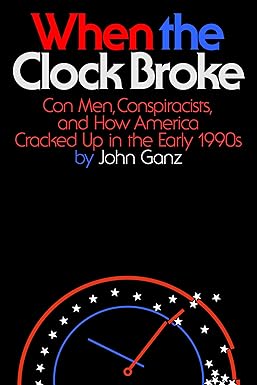
I picked up this book from Portsmouth (NH) Public Library mainly due to this review from Brian Doherty at the Reason website. (I don't think it made it into the magazine.) Doherty called it "a solidly educational and entertaining work of political history." Ganz's implicit thesis: the early 1990s were an important part of the story of How We Got Here, thirty years later.
But, really, you can say that about any period in American history, can't you?
Ganz focuses on personalities of the period, mostly ones he finds colorful, outrageous, or dangerous. As Doherty notes, he spends a lot of words on Murry Rothbard, concentrating on his flirtation with paleoconservatives. The book's title is from a Rothbard speech; you can also find it in one of his long-winded articles from the Rothbard-Rockwell Report, reproduced by the Mises Institute. And it's in response to the cliché "You can't turn back the clock."
We shall break the clock of social democracy. We shall break the clock of the Great Society. We shall break the clock of the welfare state. We shall break the clock of the New Deal. We shall break the clock of Woodrow Wilson’s New Freedom and perpetual war. We shall repeal the 20th century.
As Doherty also notes, despite Ganz's title, this did not come close to happening.
Anyway, Ganz's history is wide-ranging and (you might argue) idiosyncratic. In addition to Rothbard, Ganz looks at folks like David Duke, Bo Gritz, John Gotti, David Dinkins, Rudy Giuliani, Rush Limbaugh, Jesse Jackson, … And, naturally enough, the major figures of the 1992 presidential campaign: George H.W. Bush, Bill Clinton, Ross Perot, Pat Buchanan.
Anyone remember Clinton's "Sister Souljah" moment? Ganz does. Were you aware that a professor named Caroll Quigley had an inordinate influence on Bill Clinton's philosophy? I didn't, but Ganz spends many pages on exploring that.
And Ross Perot was a holy terror back then about the deficit and associated national debt. Why, we were adding "$1 billion in debt every 24 hours"!
Reader, according to these folks, over the past year, the debt averaged a $6 billion increase per day.
One little sentence on page 20 jumped out at me, and I fear it colored my attitude toward the book:
During the presidential campaign of 1980, Ronald Reagan campaigned against "welfare queens."
Uh, reader, no he did not. I blogged about this ten years ago (heavily relying on this Reagan-hostile Slate article). As near as anyone can tell, Reagan used the term "welfare queen" (not "queens") once, in 1976 (not 1980), during one of his radio addresses. And he was quoting the term used in a Chicago Tribune story about Linda Taylor, an actual person.
I noticed a few other drive-by mini-slanders throughout, unsourced. If you're tempted to repeat any of 'em as gospel, caveat lector.
But another unsourced and widely repeated factoid on page 189: Gene Roddenberry was the speechwriter for LAPD chief William Parker in the 1950s, and based Star Trek's Mr. Spock on him. I didn't know that! And it might be true!
![[The Blogger and His Dog]](/ps/images/me_with_barney.jpg)



